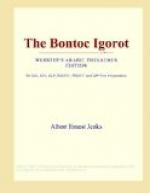Captain Chas. Nathorst, of Cervantes, has told me of a dance in Lepanto, believed by him to be a funeral dance, in which men stand abreast in a long line with arms on each other’s shoulders. In this position they drone and sway and occasionally paw the air with one foot. There is little movement, and what there is is sluggish and lifeless.
Games
Cockfighting is the Philippine sport. Almost everywhere the natives of the Archipelago have cockfights and horse races on holidays and Sundays. They are also greatly addicted to the sport of gambling. The Bontoc Igorot has none of the common pastimes or games of chance. This fact is remarkable, because the modern Malayan is such a gamester.
Only in toil, war, and numerous ceremonials does the Bontoc man work off his superfluous and emotional energy. One might naturally expect to find Jack a dull boy, but he is not. His daily round of toil seems quite sufficient to keep the steady accumulation of energy at a natural poise, and his head-hunting offers him the greatest game of skill and chance which primitive man has invented.
Formalities
The Igorot has almost no formalities, the “etiquette” which one can recognize as binding “form.” When the American came to the Islands he found the Christians exceedingly polite. The men always removed their hats when they met him, the women always spoke respectfully, and some tried to kiss his hand. Every house, its contents and occupants, to which he might go was his to do with as he chose. Such characteristics, however, seem not to belong to the primitive Malayan. The Igorot meets you face to face and acts as though he considers himself your equal — both you and he are men — and he meets his fellows the same way.
When Igorot meet they do not greet each other with words, as most modern people do. As an Igorot expressed it to me they are “all same dog” when they meet. Sometimes, however, when they part, in passing each other on the trial, one asks where the other is going.
The person with a load has the right of way in the trail, and others stand aside as best they can.
There is commonly no greeting when a person comes to one’s house, nor is there a greeting between members of a family when one returns home after an absence even of a week or more.
Children address their mothers as “I’-na,” their word for mother, and address their father as “A’-ma,” their word for father. They do this throughout life.
Igorot do not kiss or have other formal physical expression to show affection between friends or relatives. Mothers do not kiss their babes even.
The Igorot has no formal or common expression of thankfulness. Whatever gratitude he feels must be taken for granted, as he never expresses it in words.
When an Igorot desires to beckon a person to him he, in common with the other Malayans of the Archipelago, extends his arm toward the person with the hand held prone, not supine as is the custom in America, and closes the hand, also giving a slight inward movement of the hand at the wrist. This manner of beckoning is universal in Luzon.




